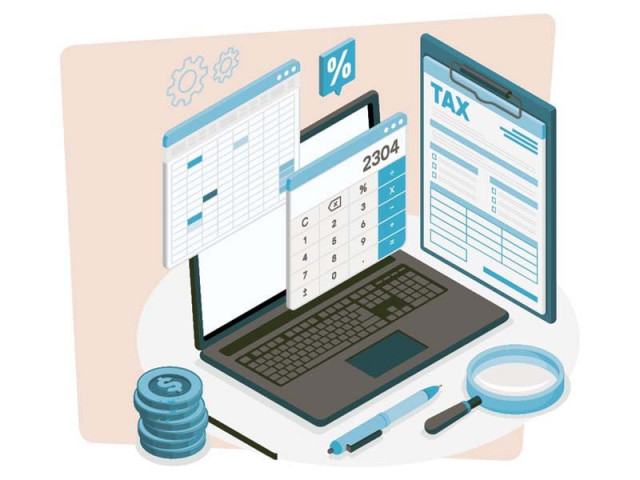Rs9.2tr new tax target likely
Report suggests FBR may again rely on limited number of taxpayers to meet goal

The federal government has planned to fix the new tax target at Rs9.2 trillion amid disclosure by the Reforms and Revenue Mobilisation Commission (RRMC) that the Federal Board of Revenue (FBR) collected three-fourths of income tax from just 13,958 taxpayers.
The scathing interim report of the commission exposes the FBR’s shallow performance. Findings of the report suggest that without reshaping the tax reform structure, the FBR will again put the burden of Rs9.2 trillion target for fiscal year 2023-24 on the same limited number of taxpayers.
Sources said that the Ministry of Finance had suggested around Rs9.2 trillion in new tax target, which was 21% higher compared to the current year. However, the ministry’s estimates suggest that tax collection during the outgoing fiscal year may remain below Rs7.2 trillion with a shortfall of around Rs450 billion.
The new target may be Rs2 trillion, or 27%, higher than the anticipated collection of Rs7.2 trillion in the current fiscal year. Officials of the Ministry of Finance believe that 27% growth should not be a challenge given the fact that the nominal economic growth in the next fiscal year is projected at 25%. The FBR may have to take new tax measures for the collection of at least Rs200 billion, if the target is set at around Rs9.2 trillion. But if Pakistan seeks the endorsement of the International Monetary Fund (IMF), the tax target may go up further.
However, FBR officials may miss the new target as strict import restrictions are in place. The revenue board’s performance has largely remained dependent on imports.
Ashfaq Yousaf Tola-led RRMC has documented what it calls the “lacklustre” performance of the FBR. The government had set up the commission with the task of proposing reforms for the outdated tax machinery that has been struggling to achieve its goals. The commission’s report revealed that there were 7.6 million registered National Tax Number (NTN) holders but merely 3.6 million filed income tax returns. It indicated that the FBR had failed to bring four million people to the tax network and enforce its writ.
It highlighted that a large number of individuals got tax concessions, but they did not file tax returns in subsequent years, underscoring the need for strict enforcement measures. Moreover, out of the 3.6 million registered return filers, 2.2 million were tax filers and the remaining 1.4 million declared zero income in their annual income tax returns.
In tax year 2021-22, the FBR collected Rs1.6 trillion in income tax. The RRMC report revealed “only a small fraction of taxpayers, 13,958 to be exact, contributed 75% or Rs1.194 trillion of the total income tax collection in FY22. The 13,958 individuals were equal to 0.39% return filers and only 0.005% of the total population.”
Just 28,027 taxpayers paid 80%, or Rs1.274 trillion, of income tax. Similarly, 85% of income tax, or Rs1.4 trillion, was paid by 57,454 taxpayers while 90%, or Rs1.43 trillion, was paid by 126,908 taxpayers and 95%, or Rs1.5 trillion, was paid by 317,940 individuals.
“When compared to India, the situation seems to be drastically different. In India, 90% of tax was paid by 22% of total filers, whereas in Pakistan, only 3.5% of filers contributed 90% of income tax collection,” said the commission’s report.
The commission noted that only a small number of taxpayers contributed significantly to the income tax collection in Pakistan, and “our tax base is shallow, which underscores the need for greater tax compliance and a broader tax base in order to achieve sustainable revenue generation for the government.”
RRMC recommended that in order to improve tax compliance and generate sustainable tax revenue, the FBR needed to adopt a more efficient approach towards broadening the tax base and leveraging the use of information technology to bring more individuals to the tax net. It called for re-examining the budget-making process as a must. It has been “found that most of the revenue measures undertaken in the last three years were not appropriately based on proper data evaluation, hence, those mostly remained unachievable.”
Furthermore, there should be an effective and modern budgeting system and by and large the performance of the FBR is not found up to the mark, according to the commission’s findings. RRMC noted that like income tax, the FBR was facing a similar kind of obstacle in sales tax collection. There were only 217,328 sales tax registered persons, of which 67,885 were tax filers.
Of those who filed returns, only 0.17% contributed 75%, or Rs696 billion, of total sales tax collection in the last fiscal year and only 0.25% contributed 80%, or Rs742 billion, of sales tax receipts. These numbers are highly suggestive of the FBR’s poor performance as sales tax collection is unsatisfactory, according to the commission.
Published in The Express Tribune, May 11th, 2023.
Like Business on Facebook, follow @TribuneBiz on Twitter to stay informed and join in the conversation.



















COMMENTS
Comments are moderated and generally will be posted if they are on-topic and not abusive.
For more information, please see our Comments FAQ